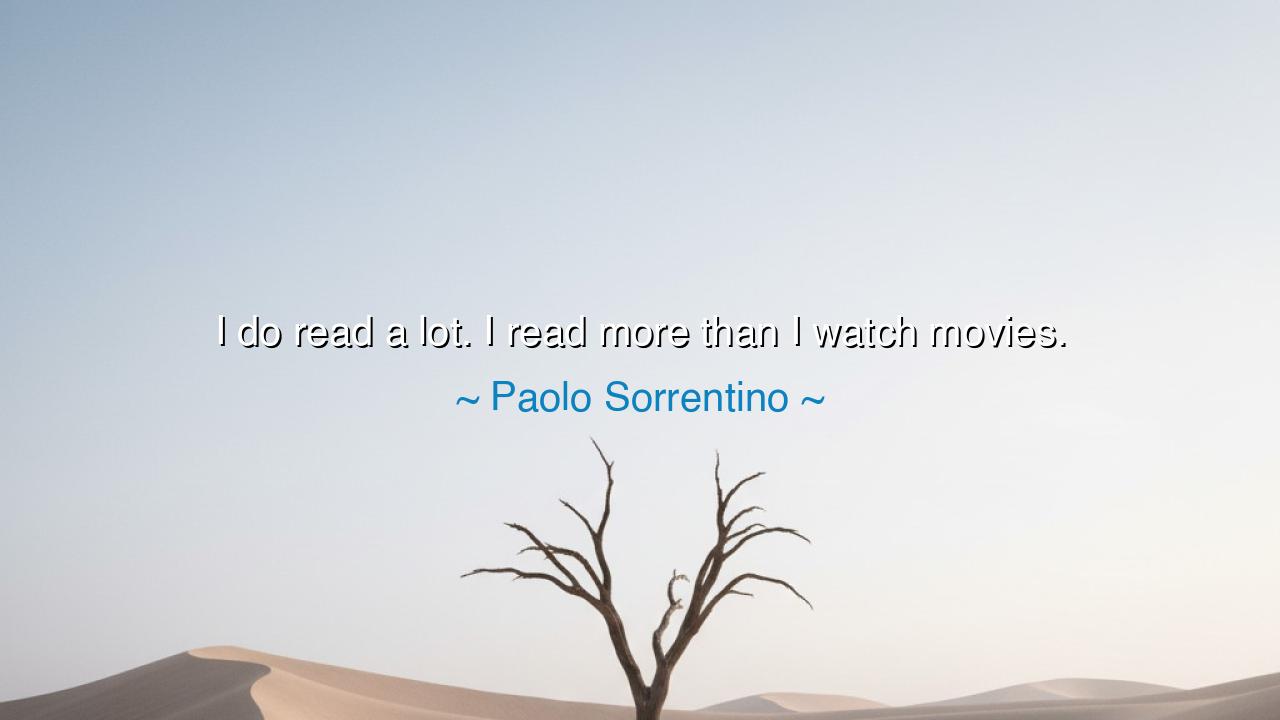
I do read a lot. I read more than I watch movies.






In a world where the visual and sensory often dominate the landscape of human experience, Paolo Sorrentino’s words, “I do read a lot. I read more than I watch movies,” bring us back to the power of words, to the quieter and more introspective side of human existence. In an era where we are constantly inundated with images, sounds, and distractions, Sorrentino’s statement is a reminder of the timeless value of reading, of immersing oneself in the written word, and of the deep reflection and intellectual engagement it fosters. While movies provide immediate entertainment, reading offers a more profound, lasting connection to the world, offering opportunities for personal growth, philosophical exploration, and the cultivation of wisdom.
In the ancient world, the written word held a sacred power. The Greeks and Romans revered the written works of philosophers, historians, and poets. Plato, in his dialogues, sought not only to entertain but to instruct, and his works were meant to provoke the reader into reflection and self-examination. The ancient oral traditions of storytelling eventually gave way to written texts, as philosophers and scholars realized that written words could preserve knowledge for future generations. For Socrates, the true philosopher was one who pursued wisdom not through shallow entertainment but through rigorous thought and reflection. Plato’s portrayal of Socrates in works like the Republic demonstrates that the written word was considered not just a medium of communication, but a vessel for deeper truths and moral guidance. Thus, reading was seen as a way to access the divine, to learn from the ancients, and to cultivate the soul.
The Romans, too, had a profound respect for the written word. Figures such as Cicero and Seneca used letters and writings to express their philosophical thoughts and to teach others how to live virtuous lives. For Cicero, his letters were not mere correspondence—they were a means of instruction, filled with wisdom on how to balance the affairs of state with personal integrity. Seneca, in his letters to Lucilius, imparted lessons on stoicism, teaching that the written word could be a guide to living a life of virtue and reason. Both philosophers, though deeply engaged in the public sphere, turned to the written word as their most powerful tool for understanding the world and shaping their internal lives. In this, they set an example that resonates with Sorrentino’s preference for reading—seeing it as a more intimate and personal means of engaging with the world, one that nourishes the soul and shapes the mind.
Reading, in its essence, is an act of self-reflection. It allows us to engage with the thoughts of others in a deeper way than visual media often permits. While movies may offer instant gratification and easily consumable plots, books require patience and dedication. They invite us to slow down, to immerse ourselves in a world of words, and to engage with characters, ideas, and philosophies on a longer timeline. This depth is often missing from the fast-paced nature of movies, where the experience can be superficial, offering only fleeting emotional responses. When Sorrentino speaks of reading more than watching movies, he is emphasizing the value of intellectual exploration—the kind that books provide, as they are designed to engage the reader’s mind and imagination. This act of reading is not merely for entertainment, but for the growth of the mind, a practice that echoes the ancient idea that the pursuit of knowledge and understanding is the highest form of human endeavor.
The lesson from Sorrentino’s words is clear: in our quest for wisdom and personal development, we must not neglect the written word. Just as the ancients valued the deep reflection that came from reading and contemplation, so too should we recognize the power that books hold in shaping our minds and hearts. Movies, though captivating and entertaining, often offer us only a surface-level experience. They are powerful in their own right, but they cannot replace the depth and intellectual nourishment that reading provides. It is in the pages of books that we find the space for personal growth, for self-examination, and for engaging with the complex questions of existence.
In our modern lives, we are often inundated with visual media that can distract and overwhelm our senses. Yet, we must make time for reading, for the slow and deliberate process of absorbing knowledge through books. Whether it be philosophy, literature, or history, each page offers us a chance to engage with the world in a way that movies often cannot. Sorrentino’s preference for reading over watching movies is a call to action, reminding us to value the time we spend with the written word, to cultivate our minds, and to never underestimate the power of reflection. Like the ancients, we must look to books to guide us toward a more thoughtful, meaningful life.
Let us then, in the spirit of Sorrentino and the great thinkers of the past, prioritize reading in our daily lives. Let us embrace the depth of the written word, seeking to grow our intellect and soul through the exploration of books. While films may entertain us and offer moments of joy, it is through reading that we engage with the eternal questions of life, and through that engagement, we transform ourselves into the best versions of who we can be.






AAdministratorAdministrator
Welcome, honored guests. Please leave a comment, we will respond soon